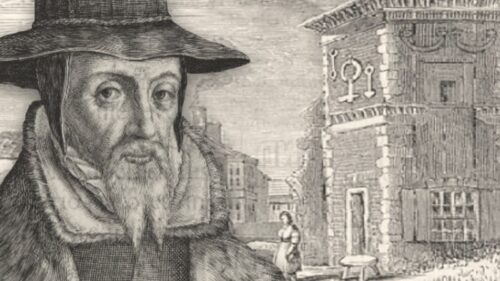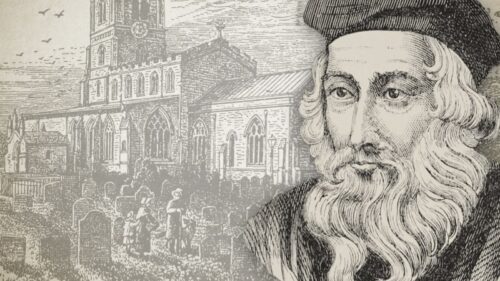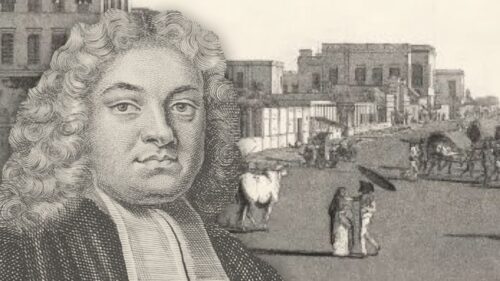George Ella
George M. Ella, born February 1939 in Yorkshire, England, has lived most of his life on the European Continent. He is a retired Senior Civil Servant formerly employed in teaching, post-graduate teacher-training, chairing examination boards and curricula work. He holds degrees from London, Hull, Uppsala, Essen, Duisburg and Marburg universities with doctorates in English Literature and Theology. Dr. Ella has written regularly since the seventies for a number of magazines and newspapers and published numerous books on Church History, including biographies of William Cowper, William Huntington, James Hervey, John Gill, Augustus Montague Toplady, Isaac McCoy and Henry Bullinger besides works on doctrine and education. He is currently finishing the third volume of his series 'Mountain Movers'; a biography of John Durie; a work on Law and Gospel and further study material for the Martin Bucer Seminar. Dr. Ella is still internationally active as a lecturer and is a Vice-President of the Protestant Reformation Society. He is keenly interested in missionary work and has written on the spread of the Gospel amongst the Same people of Lapland, the people of India and the Native Americans. This present volume follows Dr. Ella's 'The Covenant of Grace and Christian Baptism', also published by the Martin Bucer Seminar. George Ella is married to Erika Ella, nee Fleischman, a former government administrator, and they have two sons Mark (41), Director of a Polytechnic College in Bremerhaven and Robin (39), Leading Senior Physician in a newly-built Geriatric and Psychiatric clinic in Dessau.
George Ella on Doctrinal Matters
George Ella's Biographical Sketches
-
John Gill and His Successors
The witness and teaching of Dr John Gill (1697-1771) so impressed his friends Augustus Toplady and James Hervey that they maintained his work would still be of great importance to future generations. This also became the conviction of John Rippon (1750-1836) and Charles Haddon Spurgeon (1834-1892), Gill’s more well-known successors to his pastorate, but it was also the testimony of those who served for shorter periods at Carter Lane such as John Martin, Benjamin Francis and John Fawcett. The witness of these faithful men of God has helped point generations to Gill’s works which have subsequently enriched their lives. The present evangelical establishment is apparently striving to unite Calvinism with Arminianism, Baxterism and worse in an effort to promotean ecumenical doctrinal mish-mash which will suit…
-
Christ’s Work As Saviour Within The Covenant Of Grace
God’s Word, the Bible, teaches clearly that all that is necessary for a sinner’s salvation is worked out in eternity and reserved in Heaven for whoever is placed in Christ from eternity. This teaching starts at the first page of Genesis and continues to the last page of Revelation, revealing more and more of the Father’s covenanted way for mankind worked out in eternity with His Son. Thus, Christ, in eternity, secured the salvation of all in and for eternity irrespective of that elect person’s historical or geographical position. This was also the teaching of our Reformers. However, nowadays, a number of Christians are following the old heretic Marcion’s ‘criticism with a penknife’ and, calling themselves New Covenant Theologians, they reject Old Testament covenantal teaching,…
-
John Gill and the Cause of God and Truth
So often when speaking about the work of the Holy Spirit which infused the churches with new life in the 18th century, mention is made of Anglican stalwarts such as Whitefield, Hervey, Toplady and Romaine. The works of these men through God’s sovereign grace cannot be praised enough but the fact that recent biographers have highlighted their activities has tended to give the impression that other denominations, such as the Baptists, were quite inactive during this period. This is by no means the case as the testimony of John Gill shows. John Gill was born in 1697 in the town of Kettering and became a member of the Particular Baptist church there before being called to the pastorate at Goat Yard Chapel, Horselydown, London. This…
-
Reformation Today and Justification from Eternity
The March/April, 1999 number of Reformation Today features four articles on John Gill. The first, entitled John Gill – a Sketch of his Life, is a succinctly written biography of Gill’s faithful and productive life in the service of the gospel. Next, Editor Errol Hulse continues with John Gill – An Appreciation, presented as a review of The Life and Thought of John Gill (1697-1771), (ed. Michael Haykin). Here, Hulse ignores the facts of Gill’s own testimony to make what he calls ‘a fair assessment of the damage which emanated from his errors.’ Thus, though the book Hulse reviews chiefly depicts Gill as a great evangelist and soul-winner, Hulse’s one-sided critique is centred on Gill’s supposed Hyper-Calvinism and lack of evangelistic fervour. This is stretching…
-
The Ministry of Septimus Sears (1819-1877)
The Ministry of Septimus Sears (1819-1877) as Seen By his Congregation and Challenged by David Gay Septimus Sears, renowned in England as one of the country’s most outstanding pastors and preachers, started his ministry at the age of 20 before taking over Clifton Strict Baptist Church, Bedfordshire which he shepherded from 1842 to his death in 1877. Sears suffered all his life from severe heart trouble and was burdened by long periods of paralysis and typhus. His neck bones were so deformed that he had to wear an iron collar to support his head. Nevertheless, he preached three times on the Lord’s Day and often during the week. He edited two Christian magazines, The Little Gleaner and The Sower, and published many sermons besides a…
-
Whose Righteousness Saves Us?
“This is his name whereby he shall be called, THE LORD OUR RIGHTEOUSNESS.” Jeremiah 23:6“… to them that have obtained like precious faith with us through the righteousness of God and our Saviour Jesus Christ.” II Peter 1:1 Present day evangelicals tend to believe that the fierce Calvinist-Arminian controversy of the eighteenth century was merely a question of whether God chose the elect or the elect chose God. This is an oversimplification. Then the point of discussion was not so much the broad question “Who are the elect?” as the more basic question “Whom does God consider righteous?” Our brethren in those days were more interested in the means of salvation rather than the outcome. How the Calvinist-Arminian Controversy of the Eighteenth Century Began The…





